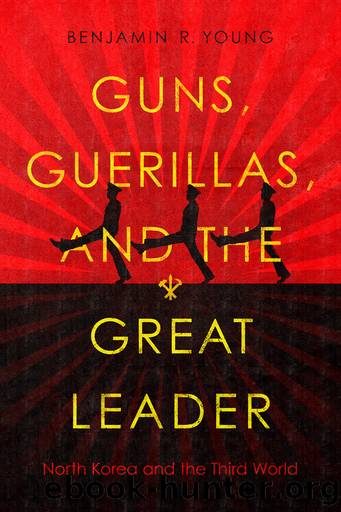Guns, Guerillas, and the Great Leader by Benjamin R. Young;

Author:Benjamin R. Young;
Language: eng
Format: epub
Publisher: Stanford University Press
Published: 2021-06-15T00:00:00+00:00
In many respects, North Koreaâs Palestine policy mirrored that of another divided Communist nation, East Germany. Historian Jeffrey Herf explains that to East German Communists, âZionism was an anachronism, a form of reactionary nationalism. Anti-imperialist nationalism was fine but not Zionist nationalism.â93 The Soviet Union, and in turn its allies, turned the language of anti-fascism used during World War II into a rhetorical weapon against Israel.94 North Korea adopted a similar approach and viewed Zionism as an outdated imperialistic ideology. For example, the North Korean magazine Kulloja published an article in 1985 entitled âIsrael Is the Cancer of Peace in the Middle Eastâ and said, âIsraelâs invasion strategy, which Arab people oppose, has been executed for a long time, and the source of the bastardsâ invasion strategy is the reactionary Zionist ideologues.â The article continued, âThe Zionistsâ ideology is reactionary, which was distributed by Jewish bourgeois nationalists who had been living in a series of European cities during the end of the nineteenth century.â 95
In addition, South Korea adopted West Germanyâs Hallstein Doctrine, which deemed the government in Pyongyang illegitimate and made it officially illegal to establish diplomatic relations with countries that also recognized the DPRK. As a way to counteract the doctrine in South Korea, North Korea, much like East Germany, supported Palestine as a way to appeal to Arab governments in the Middle East and gain diplomatic recognition in the region. This pro-Palestine policy vastly improved the DPRKâs status and prestige in the Middle East.
The earliest contact between the DPRK and the PLO took place in 1963 when Khalil al-Wazir, a founding member of the PLOâs largest faction, Fatah, traveled to North Korea for military training. In addition to al-Wazir, notable PLO members Sabri al-Banna, leader of the notoriously violent PLO splinter group Abu Nidal Organization, and Muhammad Daâud Awda, one of the planners of the attack on Israeli athletes at the 1972 Munich Olympics, traveled to the DPRK for military training during the early 1970s. Besides providing military training to high-level PLO members, Pyongyang also provided the Palestinian militants with BM-11 rocket launchers.96 In 1969, a Lebanese journalist asked Kim Il Sung to give advice to Palestinian guerillas based on his previous experiences fighting the Japanese colonialists as a guerilla fighter. Kim gave the journalist a brief history of his anti-Japanese guerilla army during the 1930s and said, âVictory will be hastened if the Palestinian people further strengthen their armed guerilla force organizationally, ideologically, and militarily, lay the solid mass base of the struggle, rally all the revolutionary and mass organizations firmly so as to cement the unity of the revolutionary forces.â97
As illustrated by Kim Il Sungâs advice to the Lebanese journalist, the DPRKâs public support for the Palestinian struggle came primarily through its rhetoric of anti-colonial solidarity. From celebrating the âday of world solidarity with the Palestinian peopleâ to announcing a âweek of Palestinian solidarityâ in its propaganda, the North Korean state media rarely missed an opportunity to show unity with their Palestinian comrades. In 1971,
Download
This site does not store any files on its server. We only index and link to content provided by other sites. Please contact the content providers to delete copyright contents if any and email us, we'll remove relevant links or contents immediately.
| Africa | Americas |
| Arctic & Antarctica | Asia |
| Australia & Oceania | Europe |
| Middle East | Russia |
| United States | World |
| Ancient Civilizations | Military |
| Historical Study & Educational Resources |
The Sympathizer by Viet Thanh Nguyen(4095)
The Rape of Nanking by Iris Chang(4023)
World without end by Ken Follett(3345)
Ants Among Elephants by Sujatha Gidla(3279)
Blood and Sand by Alex Von Tunzelmann(3055)
Japanese Design by Patricia J. Graham(3000)
City of Djinns: a year in Delhi by William Dalrymple(2435)
Foreign Devils on the Silk Road: The Search for the Lost Treasures of Central Asia by Peter Hopkirk(2388)
Inglorious Empire by Shashi Tharoor(2345)
The Queen of Nothing by Holly Black(2318)
In Order to Live: A North Korean Girl's Journey to Freedom by Yeonmi Park(2302)
India's Ancient Past by R.S. Sharma(2295)
Tokyo by Rob Goss(2292)
India's biggest cover-up by Dhar Anuj(2245)
Tokyo Geek's Guide: Manga, Anime, Gaming, Cosplay, Toys, Idols & More - The Ultimate Guide to Japan's Otaku Culture by Simone Gianni(2239)
The Great Game: On Secret Service in High Asia by Peter Hopkirk(2228)
Goodbye Madame Butterfly(2162)
Batik by Rudolf Smend(2007)
Living Silence in Burma by Christina Fink(1977)
